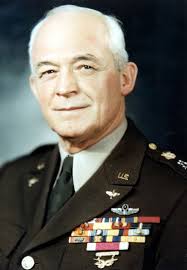Search
Henry Harley "Hap" Arnold

Born - Died
Henry Harley "Hap" Arnold was an American General.
Arnold was born June 25, 1886 in Gladwyne, Pennsylvania. Arnold's father was a Baptist and Arnold himself was going to go to school to become a Baptist minister. When Arnold's brother defied their father and refused to take the test to get into West Point, Arnold took the test. He was second on the list of candidates and they posted him to West Point when the primary candidate revealed he was already married, which was prohibited by West Point at the time.
Although Arnold had intended to follow along his fathers faith and become a Baptist minister, Arnold's personality followed his mother's. Arnold's mother was known as a fun lover, especially compared to Arnold's father. It was this influence which probably led Arnold to become one of the founding members of the "Black Hand", a group of cadet pranksters.
Arnold graduated from West Point 66th out of 111 cadets. This caused Arnold not to get the posting to Cavalry he wanted. Instead he was posted to infantry and, after some protests on Arnold's part, be assigned to the Philippines. It the Philippines Arnold met and assisted Captain Arthur Cowan. Cowan later got assigned to find pilots for the Army Air Corps (then a part of the Army Signal Corps). He immediately thought of Arnold.
After two years, in 1911, Arnold attended aviator school in Dayton, Ohio. Though individually instructed, Arnold's class contained another Army officer, a Naval officer and 3 civilians. In 1913 he got recognized as one of the first 24 military aviators, entitling them to wear a newly created Military Aviator insignia.
In 1912, during an exercise, Arnold experienced a near fatal crash. He grounded himself and immediately requested a leave of absence. Because of the high risk nature of early Military Aviation, no stigma was attached to such a request and his leave of absence was granted. During his leave he became reacquainted with Eleanor "Bee" Pool, the daughter of one of his fathers patients. The two got married in 1913.
By the time World War I had started, Arnold was back flying. He had been assigned a command responsible for setting up an airfield in the Panama Canal Zone. Arnold was heading to Washington D.C. from Panama by ship when the United States declared war on Germany. Arnold's arrival in Washington was poorly timed. He was immediately assigned to military command in Washington, rather than traveling to France as he had requested. Arnold eventually made it to the battlefield of World War I, unfortunately for Arnold he arrived on November 11, 1918, the day of the Armistice.
In 1938 Arnold was appointed the Chief of the Air Corps. This was after some political wrangling had been going on for years regarding the fate of the Air Corp. A rift had been created within the ranks of the Army and the Air Corp as to whether the Air Corp should be separated out and turned into it's own autonomous branch of service.
The rift continued after his appointment and extended to the White House. In 1941 President Roosevelt refused to send Arnold's name to congress to officially be promoted to major general. It wasn't until Arnold was sent on special assignment to England for three weeks and gave his official report to Roosevelt, the President changed his mind and sent the nomination to congress. If Roosevelt had not sent the nomination, Arnold only choice, to leave the service.
In 1944 Arnold was made a five star General of the Army and they placed him in command of all United States air forces.
During World War II Arnold served with distinction and received 26 decorations from foreign countries for his service.
In 1949 Arnold's designation was officially changed to General of the Air Force making him the only person to ever hold the rank of five star general in two branches of military service.
Arnold passed away on January 15th, 1950.
Arnold was a member of Union Lodge No. 7 in Kansas City, Kansas.
This article provided by Brother Eric C. Steele.